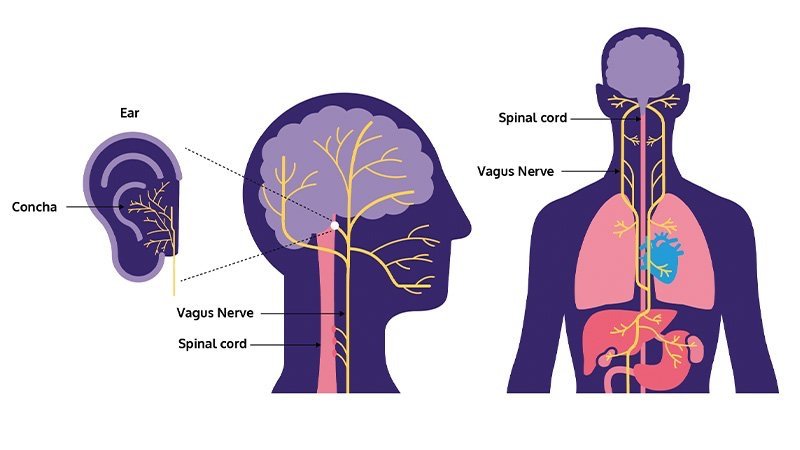The Vagus Nerve
How familiar are you with the vagus nerve? It’s been getting a lot more air time lately, and for good reason.
https://www.stroke.org.uk/research/vagus-nerve-arm-function
This nerve is incredibly important in how we function as a human.
Because I am an anatomy nerd, I want a review a little bit of the Vagus nerve’s anatomy and function with you:
It is a cranial nerve, meaning it starts in the brain and makes its way down to different parts of our body and organs. It acts as a communicator, back and forth, all day long.
It provides sensory to our external acoustic meatus (our ears), larynx, and visceral sensation to our heart and abdominal organs.
It provides motor innervation to the muscles of our soft palate, pharynx, and larynx
It innervates and provides smooth muscle mobility of our trachea, bronchi, gastrointestinal tract, and regulates our natural heart rhythms.
This is wild! One little nerve can do so much. It also explains why certain environmental triggers can cause certain physical reactions in our body.
For example, if you’re really anxious over a big job interview, and all of a sudden you have diarrhea and can’t even think about eating food without being nauseous. You’re having a physical response to stress and your heart rate increases, your intestinal peristalsis speeds up (meaning it is pushing the contents of your intestines out faster), and making your stomach feel like it’s in knots!
Why does this happen?
The vagus nerve is the main parasympathetic nerve in our body. Meaning it controls involuntary function of our heart rate, digestion, and immune system. It actually helps keep these areas functioning normally and calmly.
But when our sympathetic nervous system — the flight or fight part of our body — gets overly excited, it overrides our vagus nerve and elevates all of these symptoms. Hence, all of the uncomfortable sensations we get when we are nervous, anxious, or upset.
But what is the point in having such a sensitive sympathetic nervous system? The analogy I like to give is this: Back in the cave man days, our nervous system was designed to be either on, or off. That whole “flight or fight” thing. If you’re sitting by the fire: off. If you see a saber tooth tiger: on.
Unfortunately, our nervous system hasn’t been able to keep up with our modern society’s impact on nerves. We are constantly exposed to stressful and inflammatory triggers. These are things like: constant notifications from our cell phones, the stress of having to fulfill our duties as parents and professionals, lack of sleep, poor diets, etc.
So, instead of an “on or off switch”, our sympathetic nervous system is constantly on at a slow rumble. So it takes less and less to trigger our heightened physical and emotional responses. This can lead to digestive issues, bloating, gas, increased heart rate, tinnitus, or anxiety.
So what does the vagus nerve have to do with physical therapy?
First, as therapists that work with the body, we have an innate understanding of anatomy and the function of our nerves. And if we know that we want to stimulate the vagus nerve to ultimately calm down the sympathetic nervous system, we can perform neural manipulation techniques to do so. This means following the vagus nerve from start to finish and teaching it to move better through fascia, joints, and muscles. So that it has a clearer pathway to work. These manual techniques can be literal life savers.
As well, we function as educators on your nervous system, so that you can truly understand your triggers and the influence on your physical body. This sometimes is the very first step to healing.
It’s important to always consider a holistic approach to your health. Never separate the body into just the physical and the mental realms, because it is all one and the same. You have to treat it all, to get the best outcomes.
If you think that you have an overstimulate nervous system, and let's face, we all do now a days; then you should consider seeing a PT who knows how to work with the nervous system from both the physical, behavioral, and visceral perspectives.
At Method Physical Therapy, we all are experienced with these techniques and incorporate into the care we provide our patients. Let us help you balance your nervous system and restore you to a more functional life!

